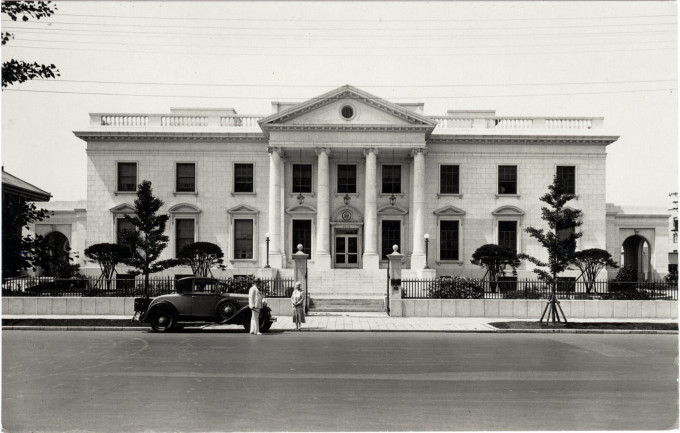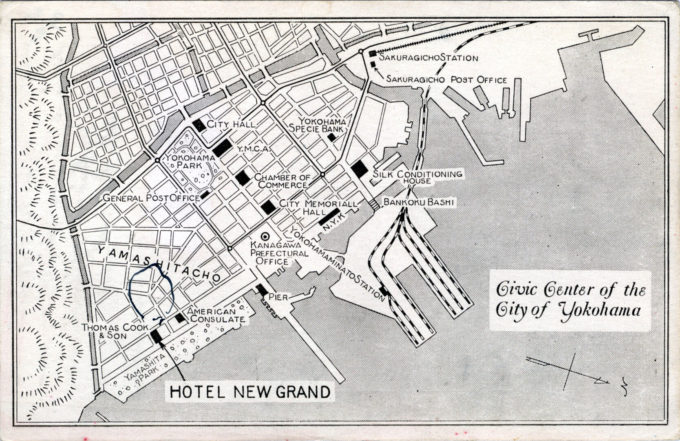
Postcard of the US Consulate, Yokohama, 1933, with Consular General Charles DeVault and his wife standing in front of the newly-completed building. The Yokohama US Consulate, designed by J.H. Morgan, was constructed at 6 Yamashita-cho, Naka-ku, Yokohama in 1932, on the site of the former consulate destroyed by earthquake and fire in 1923. The architect, Morgan, also designed Yokohama’s Kanto Gakuin Junior High School (1929-2016) and was involved with the designs of the Marunouchi Building and Yusen Building in Tokyo.
“Charles DeVault served 22 years in the foreign service of his country, starting his diplomatic career in 1918 as an attaché of the American Embassy in Paris, later serving as consul in London, Teikoku, and Yokohama.”
– Broadcasting, Vol. 26, 1944.
From the wiki: “Townsend Harris arrived in Japan in 1856 as the first U.S. Consul General, opening a temporary consulate at Shimoda, on the Izu peninsula. In 1859, Harris is appointed Minister Resident on January 19 and moves from Shimoda to the capital, Edo, where he opens a Legation at Zempukuji Temple in the Azabu neighborhood.
“On July 1, 1859, the port of Yokohama is first opened to foreign trade, and a U.S. Consulate is established at Hongakuji temple at Yokohama on July 4. In 1863, fire breaks out in the priest’s quarters of Zempukuji, Azabu, and the American Legation is destroyed. It is moved to the foreign settlement in Yokohama; the same year, the U.S. Consulate moves from Hongakuji temple to the Yokohama foreign settlement where, from 1863 to 1874, both the US Legation and the US Consulate are co-located. The US Legation is moved, in 1874, to the then-new foreign concession at Tsukiji, Tokyo, becoming the US Embassy in 1906.
“In 1923, the US Consulate in Yokohama is destroyed by the Great Kanto earthquake. It was rebuilt in 1932.”

Map: Yokohama “Civic Center”, c. 1940. The US Consulate is located to the right of the New Grand Hotel, on Yokohama’s Bund across from Yamashita Park (lower-left).
“December 7, 1941, dawned sunny and unseasonably warm in Yokohama. To take advantage of this welcome break in the weather, I joined a dozen or so colleagues from the American embassy in Tokyo at a beach house rented by the embassy at Shichirigahama. The tensions under which we had all been living and working during the recent months were set aside for the day in favor of swimming, sunbathing, drinking beer, and playing cards; and, of course, discussing the odds on when and how war would come. On the drive back to Yokohama in the late evening, it occurred to me to be thankful that our dependents, including my wife, had already been evacuated, months before, by the State Department.
“About dawn the next morning I was awakened by a phone call from a local American citizen employee of the consulate suggesting that I turn on my radio since there were reports of fighting between Japanese and British forces in Southeast Asia.
“… First I woke up the consul general, Irving Linnel, and the senior vice consul, Jule Goetzmann, and passed on the news I had heard. It was agreed that the first order of business was to seek confirmation from the embassy in Tokyo and instructions regarding the emergency measures which would have to be taken. A short time later the consul general came to my apartment to say that it had been impossible to get through to the embassy by phone, a circumstance which of itself seemed to confirm radio reports. He then instructed Jule Goetzmann and me to begin destruction of the consulate’s secret files, leaving until last the classified codes which might be required to decipher last-minute instructions from the embassy or the State Department. The next hour, which proved to be all of the time available, we spent hastily burning secret files in the incinerator in the garden.
“Shortly after 8 A.M. [on Dec. 8, 1941], while the destruction of secret files was still going on, a detachment of approximately twenty uniformed officers and men of the Japanese Kempeitai arrived to take over the consulate. Unburned files were hastily stuffed under shirts for later disposal, but it was too late to do anything about the code books, which were still locked in a safe in the consul general’s office.
“The staff and employees of the consulate were peremptorily ordered to assemble in the main reception area of the office where the major in command of the guard detachment proceeded to lay down the law. The staff of the consulate, he said, were now prisoners of the Japanese, a fact which we would do well not to forget.
“… The major then began his inspection of the consulate, accompanied by the consul general and his staff. As he moved through the offices the major demanded that all safes and filing cabinets be opened for his inspection. He removed nothing, however, merely looking and then closing them again under Kempeitai seals. When the large safe in the consul general’s office was opened for him, he confirmed with evident satisfaction the presence of the code books, after which he affixed the Kempeitai seal to the closed safe. In the consulate living quarters the major ordered the confiscation of all radios and writing materials.
– “A Footnote to History: How two young American vice consuls stole back diplomatic code books seized at the outbreak of the Pacific War“, American Diplomacy, by Niles W. Bond, 2002
(Newsreel) Americans marry Japanese brides at the US Consulate, Yokohama, 1947.

